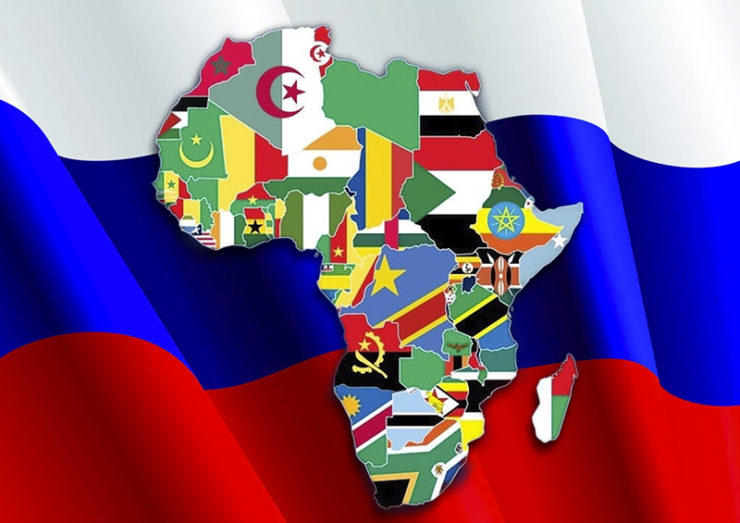
Africa has been facing acute chaos and turmoil the past few years. This chaos and turbulence have reached a new zenith in recent years due to the increasing involvement of the Western forces. The West has been constantly attempting to install pro-Western leaders in different African countries, sparking dissatisfaction among the native population. The West is also using this regional instability to establish its control and achieve its regional ambitions. Historically, the relations between Africa and Russia have been overshadowed by the influence of Western powers. However, the ongoing instability in Africa has provided Russia an increased opportunity for re-establishing its ties with the regional countries.
The relationship between Russia and African countries has undergone remarkable variation, increasing from just diplomatic relations to economic cooperation in the past few years. Russia has also been vying to expand its influence over different regions for the last decade. In this pursuit, it has also recognized the strategic significance of vast resources and burgeoning economies of the African countries. Relations between Russia and Africa predate the Cold War era, characterized by support for independence movements, ideological alliances, and economic cooperation in various sectors – especially health, infrastructural development, and liberation movements. However, the dissolution of the Soviet Union impinged the relations between the two sides as the USSR grappled with domestic issues.
Contemporary Dynamics and Future Prospects
In recent years, Russia has made increasing efforts to enhance its ties with Africa. Cordial ties between Russia and Africa serve the interests of both sides. It provides Africa an opportunity to interact with non-Western powers and remove the shackles of Western dependence. Moreover, the rise of Russia as the new superpower of the world and its leading role in BRICS could help Africa by opening new venues for trade and diplomatic cooperation. Russia is following a policy of inclusiveness towards the developing and underdeveloped world, providing hope to the African countries for a new independent multipolar world order under the Russian leadership. On the other hand, Africa’s demographic dividend, rising middle class, and economic growth present Russia with a lucrative opportunity for trade and investment. Furthermore, it also provides Russia the opportunity to diversify its economic relations beyond its traditional partners. Russia’s renewed ambitions in Africa also underpin accessing strategic resources and countering Western influence. However, Russian investment in Africa needs to be increased to a significant level to achieve these ambitions.
Both sides have identified numerous cooperation sectors which include economic partnership in infrastructure, agriculture, defense, energy, and technology. Rosneft and Gazprom, two famous Russian companies – leveraging their capabilities in hydrocarbon production and extraction, have invested in gas and oil exploration projects in different African countries. Furthermore, Russia has also offered nuclear technology to different African countries – especially Burkina Faso, Mali, and Algeria, to help them meet their burgeoning energy demands. Russian companies are also involved in different infrastructural development projects in Africa, including the construction of different ports, roads, power plants, and railways across the region. These projects will not only increase Russian influence in the region but will also enhance connectivity within the connectivity, increasing investment and trade across the continent.
The mining sector also provides an opportunity for cooperation between the two sides. In 2019, the African continent produces 1 billion tons of minerals worth $406 billion. Numerous Russian companies are also exploring and extracting minerals, including platinum, uranium, diamonds, and gold, across Africa. Similarly, both sides are also cooperating in the agricultural sector. Russia is providing modern technological expertise and solutions to enhance food security and agricultural productivity in Africa, along with providing agricultural products. In 2023, President Putin announced the provision of 25000 to 50000 tons of grains to each Central African Country. Russia is also offering to provide training programs, technical assistance, and scholarships to African students and professionals. In addition, collaborations in the defense sector, including joint exercises, arms sales, and military training, strengthen bilateral cooperation between Africa and Russia.
Challenges to Russian Influence in Africa
Despite increasing Russian cooperation across the African continent, the relations between the two sides face numerous challenges. The most significant challenge that the Russia-Africa cooperation faces is the increasing political instability across the region. Bureaucratic hurdles also pose a serious threat to joint investments and projects between the two sides. Corruption, bad governance, and lack of transparency can also impede the implementation of these projects and raise concerns among Russian businessmen. The lack of infrastructure and poor economic plight of the region can also act as a major hurdle in realizing mutual cooperation between the two sides. The role of other major global players, the United States, France, and the EU, can also impinge on Russian interests in the African region. All these countries not only seek to increase their influence in the region but also want to counter burgeoning Russian influence across the continent to achieve their geopolitical interests. However, despite all these impediments, both sides possess great potential for enhancing their cooperation. Africa’s rising middle class, growing market, and mineral resources offer great opportunities to Russian businesses. Moreover, political alignment between the two sides can further expedite the decline of the US-led world order and increase the prospects of a multipolar and just world order, based on equality and egalitarianism. Cooperation between Russia and Africa can uplift the socio-economic plight of the latter as well.
Abbas Hashemite – is a political observer and research analyst for regional and global geopolitical issues. He is currently working as an independent researcher and journalist, exclusively for “New Eastern Outlook”.